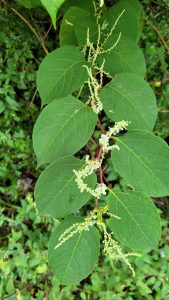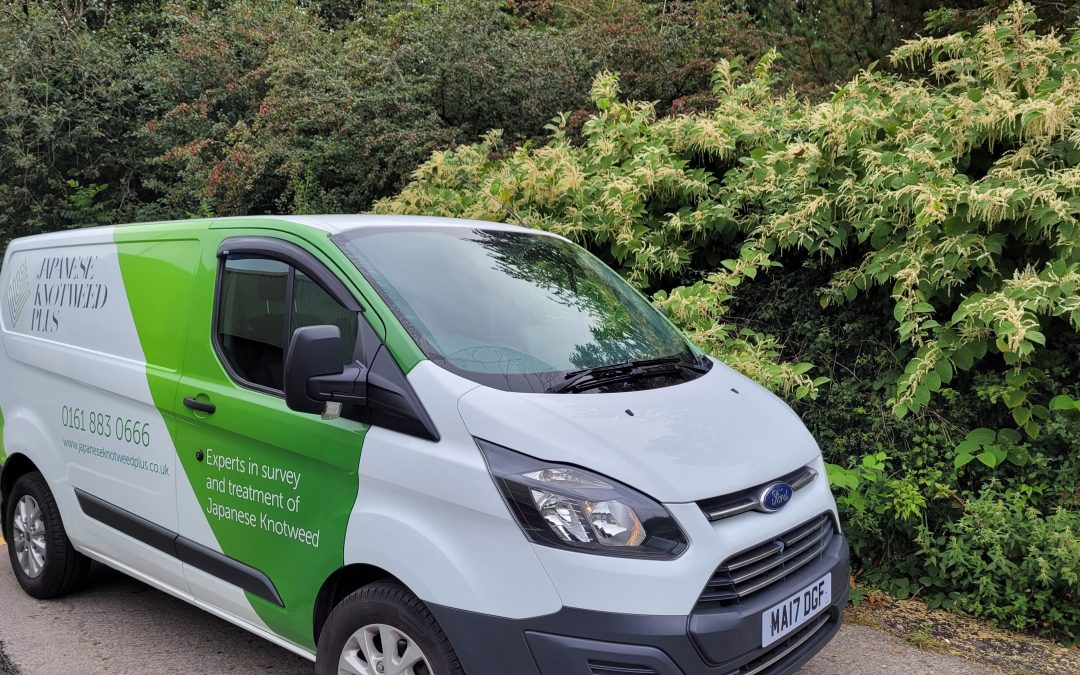Tackling Japanese Knotweed in the West Midlands and Birmingham:
Legislation and Treatment Plans
In the heart of England lies the vibrant region of the West Midlands, home to historic landmarks, bustling cities, and picturesque landscapes. Among its natural beauty lurks a silent invader – Japanese knotweed. This invasive plant species has become a significant concern for homeowners, property buyers, and environmentalists alike. In this blog post, we’ll delve into the issue of Japanese knotweed in the West Midlands and Birmingham, exploring the importance of surveys, legislation surrounding its presence when buying property, and effective treatment plans for eradication.
Understanding Japanese Knotweed:
Japanese knotweed (Fallopia japonica) is a highly invasive plant species native to East Asia. Introduced to the UK in the 19th century as an ornamental plant, it has since spread rapidly, colonizing various habitats with its aggressive growth. Japanese knotweed poses a significant threat to biodiversity, infrastructure, and property value due to its vigorous rhizome system, capable of causing structural damage to buildings, roads, and drainage systems.
When did Japanese Knotweed Treatment in the Midlands
Japanese knotweed (Fallopia japonica) was introduced to the West Midlands and Birmingham, much like the rest of the United Kingdom, during the 19th century. Initially brought over from East Asia as an ornamental plant admired for its attractive foliage and flowers, its aggressive growth soon saw it spreading rapidly across the country.
The plant’s ability to thrive in various habitats and climates, coupled with its resilience to harsh conditions, facilitated its establishment in the West Midlands and Birmingham. Over the decades, Japanese knotweed has become naturalized in urban areas, riverbanks, wastelands, and alongside transportation routes, posing significant challenges to local ecosystems and infrastructure. Its arrival in the region marked the beginning of a persistent battle against this invasive species, necessitating concerted efforts in control, management, and eradication to mitigate its impact on biodiversity and property values.

Japanese knotweed plant
Surveying Japanese Knotweed West Midlands and Birmingham
Before purchasing a property in the West Midlands or Birmingham, it’s crucial to conduct a thorough Japanese knotweed survey. Professional surveyors trained in identifying and assessing the extent of knotweed infestations can provide valuable insights into the presence of this invasive plant on or near the property. Survey reports detail the location, size, and severity of the infestation, enabling prospective buyers to make informed decisions regarding the property’s purchase and potential mitigation measures.
Legislation and Japanese Knotweed:
The presence of Japanese knotweed on a property in the UK carries significant legal implications for both property owners and potential buyers. Several key pieces of legislation regulate the control, management, and potential liability associated with this invasive plant species. Two primary laws that address Japanese knotweed specifically are the Wildlife and Countryside Act 1981 and the Environmental Protection Act 1990.
Wildlife and Countryside Act 1981:
This Act is one of the primary pieces of legislation governing the protection of wildlife and the conservation of biodiversity in the UK. Under Schedule 9 of the Act, Japanese knotweed is listed as a “controlled waste,”. Categorizing it as an invasive non-native species that requires special attention. This designation means that it is an offense to plant or otherwise cause Japanese knotweed to grow in the wild. Property owners are legally obligated to prevent the spread of Japanese knotweed from their land onto neighbouring properties or into the wild.
Environmental Protection Act 1990:
The Environmental Protection Act addresses various environmental issues, including the control of pollution and the management of waste. In the context of Japanese knotweed, Section 34 of the Act empowers local authorities to issue “statutory notices” requiring landowners to control or eradicate invasive plant species, including Japanese knotweed, if they pose a threat to neighboring properties or the environment. Failure to comply with these notices can result in fines or legal action.
Property owners have a legal duty of care to manage
And control Japanese knotweed on their land to prevent its spread and mitigate its impact on neighbouring properties and the environment. This obligation extends to both residential and commercial properties. When selling a property, owners are required to disclose the presence of Japanese knotweed in the property’s sale documents. However failure to disclose known infestations can lead to legal disputes and potential liabilities for the seller.
For potential property buyers, the presence of Japanese knotweed can affect property values and the feasibility of securing mortgages and insurance. Lenders and insurers may require evidence of a Japanese knotweed management plan or eradication efforts before approving loans or coverage for properties with known infestations.
In summary, the legal framework surrounding Japanese knotweed in the UK is aimed at preventing its spread. Protecting biodiversity, and mitigating its impact on property values and the environment. Property owners and buyers must be aware of their legal obligations and take appropriate measures to address Japanese knotweed infestations in accordance with applicable laws and regulations.
When buying a property in the West Midlands or Birmingham, sellers are required to disclose any known Japanese knotweed infestations. Failure to do so can result in legal disputes and financial liabilities, highlighting the importance of thorough property surveys and transparent disclosure practices in real estate transactions.
Disclosing the presence of Japanese knotweed on your property
When selling your house is crucial to comply with legal requirements and ensure transparency with potential buyers. Here’s how you can properly disclose the presence of Japanese knotweed:
Provide a Detailed Property Information Form:
When selling a property in the UK, sellers typically complete a Property Information Form (TA6) as part of the conveyancing process. This form asks specific questions about the property, including any issues related to Japanese knotweed. Be honest and thorough when completing this form, ensuring that you accurately disclose any known presence of Japanese knotweed on or near the property.
Attach Supporting Documentation:
If you have had a professional survey or treatment for Japanese knotweed conducted on your property, include copies of relevant documentation, such as survey reports, treatment plans, and completion certificates, with the Property Information Form. These documents provide additional details about the extent of the infestation and the measures taken to manage or eradicate it, offering transparency to potential buyers.
Be Transparent During Viewings:
Inform your estate agent about the presence of Japanese knotweed on your property, and ensure that they communicate this information to potential buyers during viewings. Be prepared to answer any questions that buyers may have about the infestation, treatment history, and potential implications for the property.
Seek Legal Advice:
If you’re unsure about how to disclose the presence of Japanese knotweed or have concerns about potential legal implications, seek guidance from a solicitor or conveyancer experienced in property transactions. They can provide tailored advice based on your specific circumstances and help you navigate the disclosure process effectively.
Include Special Conditions in the Sale Contract: Consider including special conditions in the sale contract that address the presence of Japanese knotweed and outline the responsibilities of both parties regarding its management and disclosure. This can provide clarity and protection for both you as the seller and the buyer.
By being transparent and proactive in disclosing the presence of Japanese Knotweed Treatment in the Midlands you can establish trust with potential buyers and mitigate the risk of legal disputes or liabilities arising from nondisclosure. Remember to consult legal professionals and follow best practices to ensure compliance with relevant laws and regulations throughout the selling process.
there are specific regulations regarding the spreading and disposal of Japanese Knotweed Treatment in the Midlands. These regulations aim to prevent the further spread of the plant and ensure its safe and appropriate disposal to minimize its impact on the environment and neighbouring properties. Two key pieces of legislation that address the spreading and disposal of Japanese knotweed are:
Environmental Protection Act 1990 (Part II, Controlled Waste Regulations):
Under this Act, Japanese knotweed is classified as controlled waste. This means that it must be disposed of properly and in accordance with waste management regulations. It is illegal to deposit Japanese knotweed waste in a manner that causes pollution of the environment or harm to human health. Property owners or contractors responsible for the removal of Japanese knotweed must ensure that it is transported and disposed of at authorized waste management facilities.
Waste (England and Wales) Regulations 2011:
These regulations impose a duty of care on individuals and businesses involved in the handling. transportation, and disposal of waste, including Japanese knotweed. This duty of care requires that waste be managed responsibly to prevent harm to the environment and human health. Property owners and contractors must take reasonable measures to ensure that Japanese knotweed waste is handled transported, and disposed of safely and legally.
In addition to these legislative measures, industry best practices and guidance documents. such as the Environment Agency’s “Code of Practice for the Management of Japanese Knotweed Treatment in the Midlands,” provide further guidance on the proper handling, treatment, and disposal of Japanese knotweed. Property owners and contractors involved in the management and removal of Japanese knotweed should familiarize themselves with these regulations and guidelines to ensure compliance and minimize the risk of legal consequences.
Overall, the legislation regarding the spreading and disposal of Japanese knotweed in the UK aims to prevent its further spread, protect the environment, and ensure that it is managed and disposed of responsibly and safely. Compliance with these regulations is essential to mitigate the impact of Japanese knotweed on biodiversity, property values, and human health.
5-Year Treatment Plan by Chemical Treatment:
Chemical treatment remains one of the most effective methods for eradicating Japanese knotweed over the long term. A comprehensive 5-year treatment plan typically involves the application of herbicides at specific intervals to target the plant’s rhizome system and inhibit its growth. Professional contractors experienced in knotweed management can develop tailored treatment plans based on the size and severity of the infestation, site conditions, and environmental considerations.
The first step in a chemical treatment plan is the initial herbicide application. this is usually conducted in late spring or early summer when the plant is actively growing. This application targets the above-ground foliage, gradually weakening the plant’s energy reserves, furthermore it restricts its ability to spread. Subsequent herbicide treatments are applied throughout the growing season and over subsequent years to ensure complete eradication of the Japanese Knotweed Treatment in the Midlands.
It’s essential to monitor the effectiveness of chemical treatment regularly through follow-up surveys and inspections. Adjustments to the treatment plan may be necessary based on observed response rates, environmental factors, and any emerging challenges. With diligent implementation and professional oversight, a 5-year chemical treatment plan can successfully eradicate Japanese knotweed and restore the integrity of the affected property.
We offer a Free 10-year insurance-backed guarantee
As part of the comprehensive 5-year treatment plan by chemical treatment for Japanese Knotweed Treatment in the Midlands and Birmingham, it’s essential to provide peace of mind to property owners. Therefore, the plan will include a free 10-year insurance-backed guarantee. This guarantee offers assurance to homeowners that in the unlikely event of knotweed regrowth following the completion of treatment, they will receive prompt remediation services at no additional cost. By coupling effective chemical treatment with a robust insurance-backed guarantee, property owners can confidently address Japanese knotweed infestations and protect their investments for the long term.
5-year Payment plan for our customers
We offer an Easy Pay payment plan over the five-year treatment period, to help make our Japanese Knotweed eradication services more accessible and affordable for our clients while ensuring good customer satisfaction. This flexible payment option demonstrates our commitment to meeting our clients’ needs and supporting them throughout their knotweed management journey.
